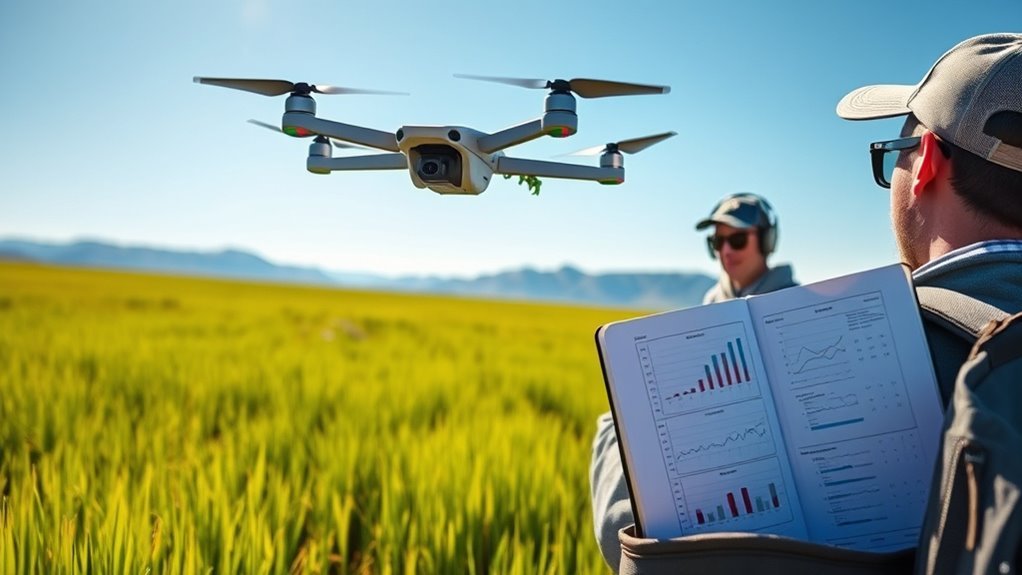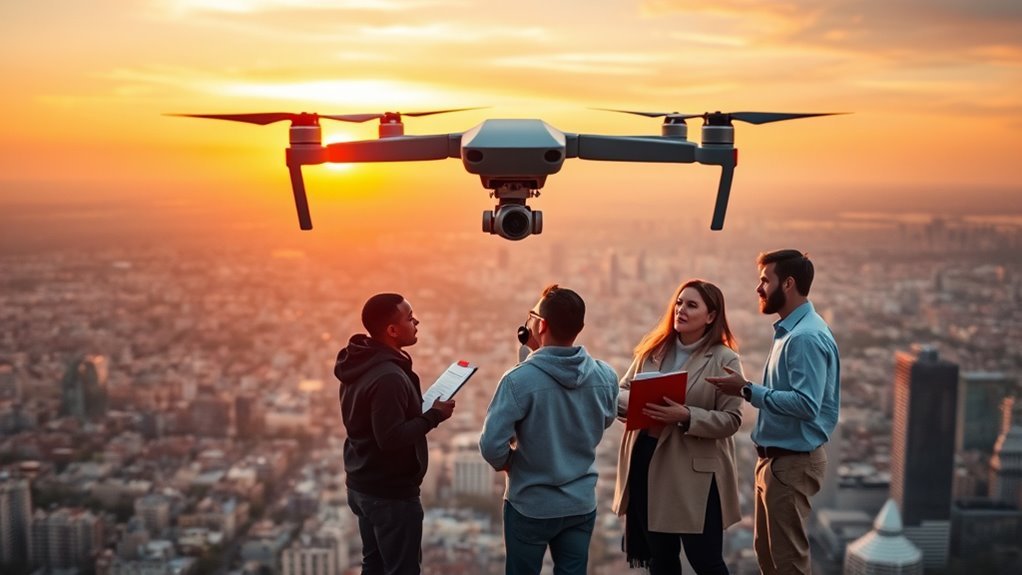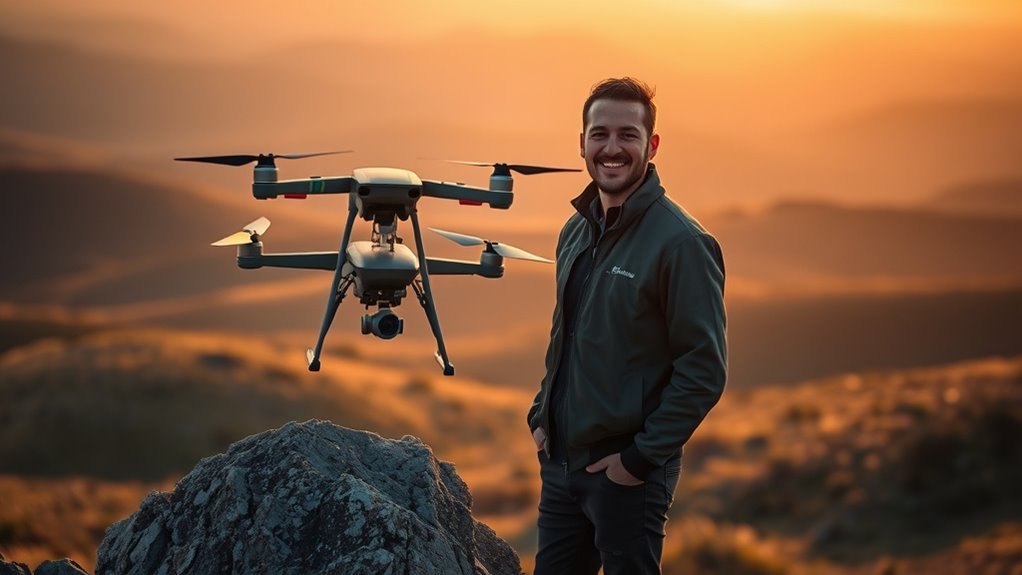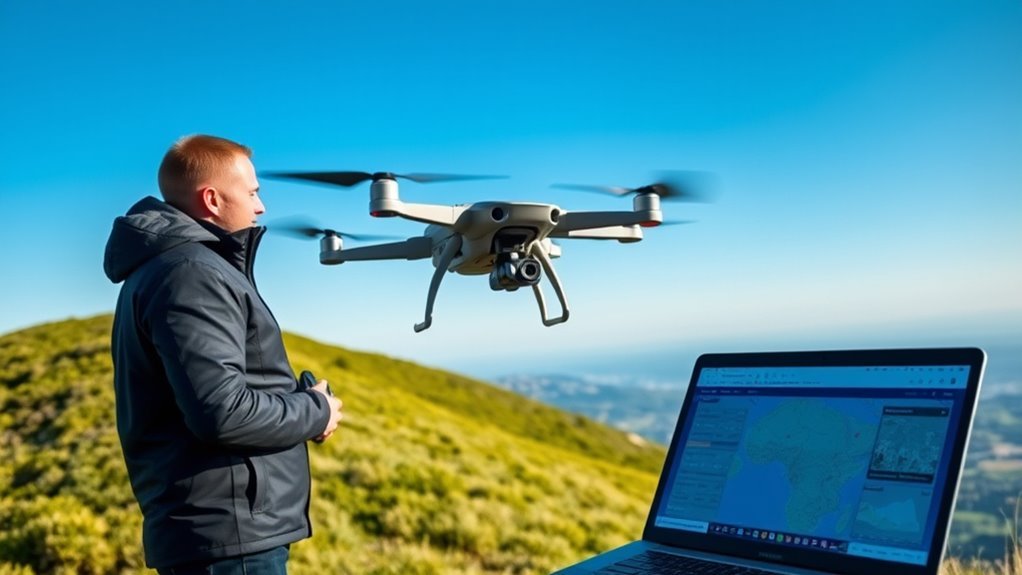As a drone pilot, you can expect to make between $50,000 and $100,000 annually, depending on your experience, location, and industry. Entry-level positions typically earn $30,000 to $50,000, while mid-level salaries range from $60,000 to $80,000. Specialized skills in areas like aerial photography or agriculture often lead to higher pay. Geographic demand also plays an essential role in salary variations. There’s more to explore about how you can maximize your earnings in this growing field.
Overview of Drone Pilot Salaries

As drone technology continues to evolve, understanding how much a drone pilot makes can provide valuable insights into this burgeoning field. Generally, drone pilots earn between $50,000 and $100,000 annually, depending on their experience, geographic location, and industry. Those with pilot certification often command higher salaries, as certification signifies expertise and adherence to regulations. Additionally, specialized sectors like aerial photography, agriculture, or construction can yield even more lucrative opportunities. As you navigate this landscape, it is crucial to reflect on factors such as ongoing training and the potential for freelance work, which can offer greater freedom and flexibility. By investing in your skills and obtaining the necessary pilot certification, you enhance your chances of maximizing your earning potential in this exciting industry.
Factors Affecting Drone Pilot Earnings

Your earnings as a drone pilot can substantially vary based on your experience level and the demand within specific industries. More seasoned pilots often command higher rates due to their advanced skills and proven track record, while emerging sectors may offer lucrative opportunities due to rising demand. Understanding these factors can help you strategically position yourself for better compensation in this evolving field. Additionally, incorporating advanced AI integration into your skill set can enhance your marketability and potential earnings as the industry evolves.
Experience Level Impact
While various factors influence a drone pilot’s earnings, experience level plays a pivotal role in determining salary potential. As you gain expertise, your ability to negotiate higher salaries improves greatly. Entry-level pilots may start on the lower end of the pay scale, but as you accumulate flight hours and specialized skills, you can expect substantial increases in your earnings. Experienced pilots often find themselves in a position to negotiate better contracts and explore advanced career opportunities. Companies value seasoned professionals who can handle complex missions safely and efficiently. Essentially, investing in your skill set not only enhances your marketability but also sets the stage for career advancement and financial freedom in the ever-evolving drone industry.
Industry Demand Variations
Given the rapid evolution of the drone industry, the demand for skilled drone pilots can fluctuate markedly based on various factors. One major influence is drone regulations; as laws change, so do the opportunities for pilots. Stricter regulations might limit where and how drones can be operated, impacting overall demand. Conversely, relaxed regulations can foster growth in sectors like agriculture and real estate, boosting job prospects. Additionally, technology advancements play a significant role. As drones become more sophisticated, pilots who can operate and maintain cutting-edge equipment will be in higher demand. If you stay ahead of these trends, you can better position yourself to seize lucrative opportunities in this dynamic industry. Adaptability is key to thriving as a drone pilot.
Experience Level and Its Impact on Salary

Your experience level as a drone pilot markedly influences your earning potential. Entry-level pilots typically see lower salaries, while those with mid-level experience can expect a notable increase, reflecting their enhanced skills and responsibilities. As you reach expert status, factors like industry specialization and project complexity can further elevate your compensation.
Entry-Level Earnings
Entry-level drone pilots can expect to earn between $30,000 and $50,000 annually, depending on various factors such as location, industry, and specific skill sets. To maximize your earning potential, consider the following elements:
- Location: Urban areas often offer higher wages.
- Industry: Filmmaking, agriculture, and real estate may pay differently.
- Entry level training: Specialized training can enhance your appeal.
- Certification requirements: Obtaining FAA certification can set you apart.
- Skill sets: Proficiency in software and drone operation boosts your value.
Understanding these factors can help you navigate your way through the drone industry, ensuring you’re on the right track to financial freedom while doing what you love.
Mid-Level Salary Range
As you gain experience in the drone industry, your earning potential increases considerably. In the mid-level salary range, you can expect to earn between $60,000 and $80,000 annually, depending on your specific role and region. Typical job titles at this stage include drone operations manager, aerial surveyor, and cinematographer. With mid-level responsibilities, you’ll likely oversee projects, manage teams, and guarantee compliance with regulations, enhancing your skill set and marketability. Your expertise in handling complex aerial missions and utilizing advanced technology will set you apart in the competitive landscape. As you navigate this level, consider how your growing experience and specialized knowledge can position you for even greater freedom and opportunities in the industry.
Expert Compensation Factors
While many factors influence a drone pilot’s salary, experience level is one of the most significant determinants. As you gain expertise, your compensation can dramatically increase due to various elements:
- Mastery of drone regulations, ensuring compliance and safety.
- Proficiency in complex aerial photography, showcasing your artistic vision.
- Experience with diverse drone models and technologies, enhancing operational efficiency.
- A solid portfolio demonstrating successful projects that attract higher-paying clients.
- Networking and reputation in the industry, leading to more lucrative opportunities.
Understanding these factors can empower you to navigate your career strategically, leveraging your experience to maximize your earning potential. As you evolve, so too will your financial freedom, allowing you to pursue more ambitious aerial ventures.
Geographic Location and Pay Variations
When considering a career as a drone pilot, it’s crucial to recognize how geographic location greatly influences earning potential. Salary disparities can be significant, shaped by demand in different regions. For instance, urban areas with booming industries often offer higher pay due to increased competition and the need for specialized drone services. Conversely, rural locations may present fewer opportunities, leading to lower salaries. Geographic trends also reveal that states with substantial infrastructure projects, like California or Texas, typically compensate pilots more generously. Understanding these factors can help you navigate your career path, ensuring you choose locations that align with your financial goals. Embracing this knowledge allows for greater freedom in pursuing lucrative opportunities as a drone pilot. Moreover, the rise of US-made drones has expanded the market, leading to increased demand for skilled pilots in various sectors.
Industry Specialization and Average Income
Although the drone industry is diverse, your earning potential as a pilot can vary considerably based on the specific sector you choose to specialize in. For instance, agriculture applications can offer lucrative contracts for crop monitoring and spraying, while filmmaking opportunities allow for creative expression and potentially high pay, especially in commercial projects. Here are other sectors where you might find your niche:
- Real estate photography and videography
- Infrastructure inspections and surveying
- Search and rescue operations
- Event coverage and aerial photography
Additionally, specialized operations like crop geofencing and spraying safety can significantly enhance your marketability and income potential in the agricultural sector. Implementing precision spraying technology in agriculture can lead to reduced chemical costs, making your services even more valuable to farmers.
Freelance vs. Full-time Employment
Many drone pilots face a crucial decision between pursuing freelance work or seeking full-time employment. Freelance flexibility allows you to choose projects that excite you, set your own rates, and dictate your schedule. However, this freedom often comes with uncertainty—irregular income and the constant hustle for new clients can be taxing. On the other hand, full-time employment offers stability and benefits like health insurance, retirement plans, and paid time off, which can provide a safety net. Yet, it often comes with less flexibility, requiring you to adhere to a structured schedule and company policies. Ultimately, the choice hinges on your priorities: do you value independence more than job security, or is stability worth the trade-off of your flexible lifestyle?
Additional Skills That Enhance Earning Potential
The decision between freelance and full-time work isn’t the only factor influencing a drone pilot’s earnings; additional skills can considerably boost your income potential. Developing expertise in the following areas can set you apart in a competitive market:
- Certification benefits: Obtaining specialized drone certifications can increase your credibility and attract higher-paying clients. Additionally, understanding advanced camera capabilities can enhance your ability to deliver high-quality visual content, appealing to clients seeking exceptional aerial shots.
- Software proficiency: Mastering editing and mapping software can enhance your service offerings, making you more valuable.
- Photography and videography skills: Understanding composition and lighting can improve the quality of your aerial footage, leading to better client satisfaction.
- Project management abilities: Efficiently managing projects can streamline operations and increase your profitability.
- Industry-specific knowledge: Familiarity with sectors like agriculture or construction can help you target niche markets and command higher rates. Additionally, being aware of regulatory compliance features will help you navigate airspace restrictions and enhance your operational capabilities.
Future Trends in Drone Pilot Compensation
As the demand for drone services continues to grow across various industries, you can expect shifts in compensation structures that reflect these changes. With emerging technologies like AI and improved imaging systems, drone pilots who adapt will likely see increased pay rates. Moreover, regulatory changes may introduce new certifications and qualifications, potentially elevating the earning potential for those who stay ahead of compliance requirements. As industries like agriculture, construction, and filmmaking increasingly rely on drones, specialized skills will become more valuable. In this evolving landscape, drone pilots who embrace continuous learning and adapt to technological advancements will not only enhance their earning potential but also enjoy greater freedom and flexibility in their careers.
Frequently Asked Questions
What Certifications Are Required to Become a Drone Pilot?
To become a drone pilot, you’ll need to understand drone regulations and complete the certification process, which typically involves passing an FAA exam. This guarantees you’re knowledgeable and compliant, maximizing your flying freedom and safety.
Can Drone Pilots Work Remotely or From Home?
Imagine soaring through the skies, controlling a drone from your living room. With remote opportunities expanding, many drone pilots enjoy home-based jobs, blending freedom with technology, allowing you to balance work and life seamlessly.
What Are Common Job Titles for Drone Pilots?
Common job titles for drone pilots include Aerial Photographer, Surveying Specialist, Agricultural Monitor, Real Estate Inspector, Infrastructure Inspector, Search and Rescue Operator, Event Coverage Specialist, and Environmental Assessor, each offering unique opportunities for flexibility and creativity.
How Can Drone Pilots Find Job Opportunities?
You might think job opportunities are scarce, but leveraging networking strategies can open doors. Explore freelance opportunities through online platforms and local events; connecting with fellow pilots boosts your visibility and potential clients considerably.
Are There Drone Pilot Unions or Professional Organizations?
Yes, there are drone advocacy groups and professional organizations that promote pilot networking. Joining these can enhance your skills, expand your connections, and keep you informed about industry trends, ensuring you’re well-prepared for opportunities.

